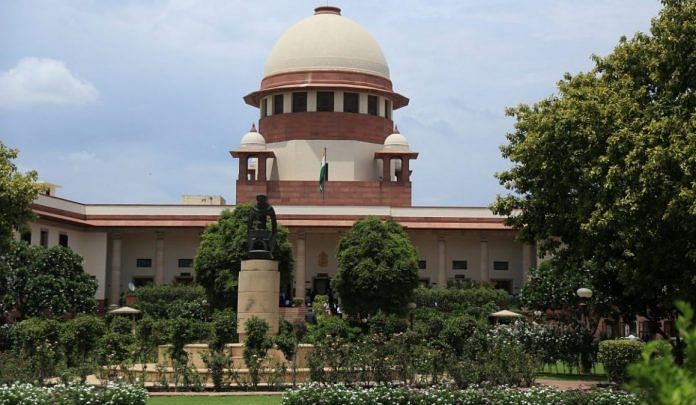The 2013 judgment, which recriminalised homosexuality, was authored by Justices G.S. Singhvi and Sudhansu Jyoti Mukhopadhaya.
New Delhi: The Supreme Court, in striking down the colonial law that criminalised homosexuality, also buried its own controversial 2013 ruling that upheld Section 377 of the Indian Penal Code.
In 2013, in a ruling that was widely criticised, Justices G.S. Singhvi and Sudhansu Jyoti Mukhopadhaya had overruled an earlier 2009 Delhi High Court judgment that had set aside Section 377.
The 2013 ruling had said Section 377 need not be struck down because only “a minuscule fraction of the country’s population constitute LGBT and in more than 150 years less than 200 persons have been prosecuted”.
Also read: Justice Indu Malhotra’s reading of Section 377 verdict was a mic-drop moment
Senior advocate Rajeev Dhawan had, at the time, called Justice Singhvi’s ruling — which was delivered on the eve of his retirement — a “hurriedly written, deeply flawed, contradictory and contrary” verdict.
The 2013 ruling was overturned a year ago, when five of the nine judges in the landmark ruling on privacy noted that the 2013 ruling was wrongly decided and “perverse” in law. Now, each of the four opinions in the Section 377 verdict has categorically stated that the 2013 decision was indeed incorrect.
In fact, each of the assertions made by Justice Singhvi, who wrote the verdict, have been torn apart in the two rulings.
Problems with the 2013 ruling
Activists and legal experts had criticised the fact that Justice Singhvi’s bench gave a patient hearing to lawyers representing religious groups who opposed decriminalising homosexuality. The petitioner in the case who challenged the Delhi High Court verdict, Suresh Kaushal, is actually an astrologer.
Chief Justice of India Dipak Misra criticised the 2013 ruling’s reliance on numbers to recognise rights. “Swayed by data, Suresh Kaushal fails to appreciate that the sustenance of fundamental rights does not require majoritarian sanction. Thus, the ruling becomes sensitively susceptible,” Misra wrote in Thursday’s Section 377 verdict.
Justice Singhvi’s ruling had also held that Section 377 does not criminalise particular people or identity or orientation, but merely identifies certain acts which if committed would constitute an offence.
“In its anxiety to protect the so-called rights of LGBT persons and to declare that Section 377 IPC violates the right to privacy, autonomy and dignity, the high court has extensively relied upon the judgments of other jurisdictions,” Justice Singhvi had said.
“Though these judgments shed considerable light on various aspects of this right and are informative in relation to the plight of sexual minorities, we feel that they cannot be applied blindfolded for deciding the constitutionality of the law enacted by the Indian legislature.”
In complete contrast, the Constitution bench in the latest Section 377 case borrows from a plethora of foreign judgements which decriminalised gay sex and legalised same sex marriages.
In the privacy judgment, Justice D.Y. Chandrachud noted two rulings — ADM Jabalpur v. Shivkant Shukla, which upheld the law suspending fundamental rights during the Emergency, and the Suresh Kaushal case as “discordant notes” to India’s Constitution.
A year after Justice Singhvi’s ruling, that further marginalised the LGBT community, another two-judge bench recognised the rights of transgenders, even directing the government to grant them reservation.
“There must not be any regression of rights. In a progressive and an ever-improving society, there is no place for retreat. The society has to march ahead,” CJI Misra said in Thursday’s ruling.
Even Justice A.P. Shah, former judge of the Delhi High Court who gave the first verdict in 2009 decriminalising homosexuality and went on to become the chairperson of the Law Commission, openly criticised the Supreme Court for passing the buck to Parliament.
Delay in correcting the ‘perverse’ judgment
In Thursday’s verdict, Justice Indu Malhotra said “history owes an apology” to the LGBTQ community for “for the delay in providing redressal for the ignominy and ostracism that they have suffered through the centuries”. The delay, however, was partly caused by the court itself.
Although the ruling was severely criticised, former CJI H.L. Dattu and Mukhopadhyaya refused to review the ruling. Naz Foundation, the NGO which had filed the Delhi High Court case, and the Congress-led Centre had sought a review.
Also read: Section 377 verdict: Can we start calling the CJI the CEO of India?
A year later, Justice Singhvi was appointed chairperson of the Competition Appellate Tribunal by the Narendra Modi government.
However, in 2016, the Supreme Court accepted a curative writ petition, the last resort designed by the court itself to remedy its rulings to “cure gross miscarriage of justice”. Simultaneously, a fresh batch of writ petitions was also filed against Section 377.
Justice Singhvi did not respond to calls seeking a comment.



